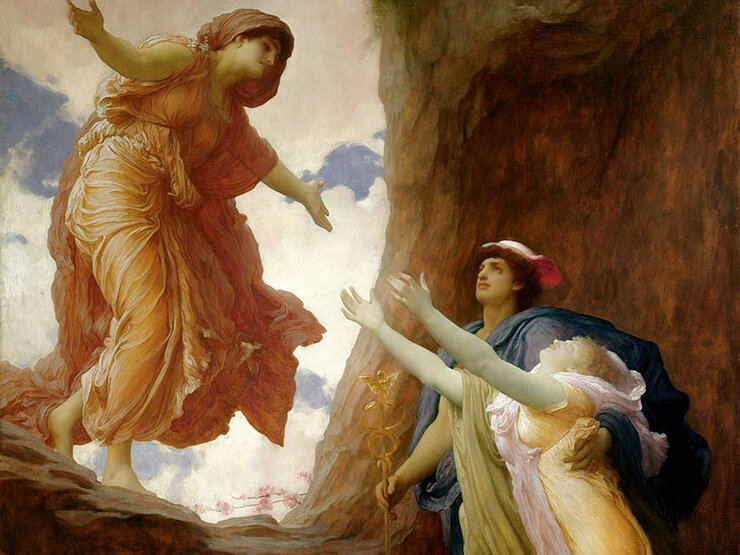Greek Mythology
Demeter

The Greek goddess of harvest, agriculture, fertility and sacred law, presiding over grains and the fertility of earth.
Demeter is the “Law-Bringer” (divine order), the sacred-law that oversees the cycle of life and death. In summarise, she is the Mother-Earth, or Mother of Grain, the giver of food.
Further Reading
Demeter was frequently associated with images of the harvest, including flowers, fruit and grain. She was also often depicted together with her daughter, Persephone, (Goddess of Harvest and Queen of the Underworld).
Demeter is represented in many different forms and images throughout the Aegean Sea, and in Crete. For example, in Anatolia, she was known as Cybele; in Rome she was Ceres; in Arcadia she was known as “Black Demeter”; “Anesidora” in Flya; and in Thesmophoria, Demeter was known as “the thesmophoroi” (the legislators) that ties in her representation of sacred-law.
Other epithets include:
”Potnia” (mistress); “Despoina” (mistress of the house); “Erinys” (Fury - similar to goddess of moral justice, Dike); “Chloe” (Green); “Malophoros” (Apple or Sheep bearer); “Lusia” (Bather); “Thermasia” (Warmth); “Cidaria” in Pheneos; and “Achaea” (called by people at Athens who migrated from Boeotia).
Some of the earliest accounts about Demeter comes from Hesiod’s Theogeny, written around 700 BCE.
Demeter’s most well known relationship in Greek mythology is with her daughter, Persephone,
sometimes known as Libera (or Prosperpina), Roman equivalent to Persephone. Together as mother and daughter, they were worshipped in a joint cult. Its major ceremonies recalls Demeter’s search for Persephone, after Persephone’s abduction into the underworld by Hades. Its festivals had huge importance to harvest in ancient times.
As legend goes, Persephone, was kidnapped by Hades, the god of the underworld, who wished her to be his wife. When Demeter that Persephone has gone disappeared, she went into search of Persephone and her distress at her daughter’s disappearance was said to have diverted her attention from the harvest and caused a famine.
So much sufferings it has caused, Zeus had to intervened, and allowed Persephone to separate her time between Earth (with her mother), and her husband Hades in the Underworld. Hence spring arrives when Persephone rejoins her mother on Earth and nothing grows in the months when her time is due back to the Underworld.
The main theme in Eleusinian secret mysteries was the reunion of Persephone with her mother Demeter, when new crops were reunited with the old seed, a form of eternity.
Demeter was often worshipped generally as a goddess of the earth, and most importantly, the Corn-mother, the goddess of cereals who provides grain for bread and blesses its harvesters.
Demeter’s greatest gift to humankind were agriculture, particularly of cereals and the Mysteries, which give the initiate higher hopes in this life and the afterlife.
The Athenians called the dead “Demetrioi”, and this may reflect a link between Demeter and ancient cult of the dead, linked to the agrarian-belief that a new life would sprout from the dead body, as a new plant arises from buried seed.
Demeter has six children, Persephone, Dionysus, Despoina, Arion, Plutus and Philomenlus.
Demeter is the daughter of Cronos and Rhea, and a sibling to Hestia, Hera, Hades, Poseidon, Zeus and Chiron.
DEMETER Enna - Rose Quartz & Tri-colour Tourmaline Long Necklace 14K GF
-
Rose Quartz, yellow tourmaline, blue tourmaline an pink tourmaline.
-
Necklace Full Length: 58.5 - 61cm
Pendant Length: 5.5cm
-
Adjustment Length: Yes
Style: Modern

